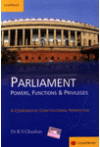
- Author(s): Dr. K.S. Chauhan
- Publisher: LexisNexis
- Edition: Ed 2013
- ISBN 13 9788180389351
- Approx. Pages 797 + contents
- Format Paperback
.............................................................................................................................
Description
Parliament: Powers, Functions and Privileges is focused on the Indian polity with comparative insights of practices and experiences of various liberal democracies. India, having given itself a basic governingdocument in the form of 'the Constitution,' is an apt model of 'nation state' to be imitated and followed. The Parliament of India, having its origin from the Constitution of India, is the supreme legislative body which reflects the representative democracy elected by an adult suffrage in a free and fair election in tune with the constitutional principles. The literature on Parliament, its working and functioning is in abundance, however, there was a vacuity in the existing pool of literatures (treatises, books, compendium, cases and materials etc. on the working and functioning of the Parliament) which covers all the three important aspects i.e. powers, functions and privileges. This book is the modest attempt to fill the existing vacuum in the world of academia.
The Parliament of India is a magnificent manifestation of trie democratic ethos and it is the repository of the constituent power which occupies central position in the Indian democratic polity. The voluminous work begins with a narrative on historical evolution of parliamentary institutions in England and India; powers and functions of Parliament, elections of its constituent members. The principles of Anti-defection law inserted through the Constitution (52" Amendment) Act, 1985, has been dealt separately in a chapter titled 'Defection as Disqualification', in addition to the disqualifications prescribed in the Constitution. Apart from this, the book makes an in-depth analysis of the origin, purposes and constitutional practices of Parliamentary Privileges outlining the height of tension between the office of the Speaker, Lok Sabha and the Supreme Court in Cash for Query case(20Q7). The chapter on 'Privileges and Media' is a special highlight of the book which also examines the role of media vis-a-vis parliamentary privileges, issues of sting operations and its limitations etc. The book also contains a separate chapter on Raja Ram Pal case (Cash for Query case).
The book aims to cater to the need and demand of understanding the Parliament as an Institution of national importance and bedrock of the Indian Polity. It would be useful for the members of the Bar, Bench, Policy makers, Research Institutions, Libraries and Law Students. Besides this, it seeks to attract the readers from various segments of the society so as to understand the powers, functions and privileges of the Parliament.
.............................................................................................................................
Contents
1. Parliament : Evolution & Development
2. Parliament : Constituents and Relationship
3. Elections
4. Parliament : Powers and Functions
5. Disqualifications of Members
6. Defection as a Disqalification
7. Parliamentary Privileges : History and Concept
8. Parliamentary Privileges : Kinds and Extent
9. Judicial Review & Parliamentary Privileges
10. Parliamentary Privilege & Media
11. Expulsion, A Case Study : Raja Ram Pal Case
.............................................................................................................................
Author Details
Dr K.S. Chauhan is an Advocate practising in the Supreme Court of India. He has conducted a famous case on parliamentary privileges popularly known as Cash for Query case(/?a/a Ram Pal v. The Hon'ble Speaker, iok Sabha) in the year 2007 before the Constitution Bench of the Supreme Court of India. He has also appeared in leading cases including M. Nagarajv. Union of India in the year 2006, and other constitutional law cases. Having completed his Master of Laws (LL.M.) from Delhi University, he obtained his Doctorate of Philosophy in Law on topic titled as, Problem of Defections and Indian Constitution-^ study of emerging trends from Maharishi Dayanand University, Rohtak. As a Parliamentary Fellow at the Institute of Constitutional and Parliamentary Studies, New Delhi, the author submitted his research dissertation on Jurisdiction of the Supreme Court. He specializes in Constitutional Law, Public Law and Service Law.
He has been part-time Lecturer (Law) at University of Delhi and taught Constitutional Law and Administrative Law. He also served as Guest Faculty at Indian Law Institute, New Delhi and various other research institutions in India. He has delivered lectures in leading law colleges of India and on important subject matters of Constitutional Law and Indian polity in training program at Bureau of Parliamentary Studies & Training. He has been a member of the Governing Council of the International Centre for Alternative Dispute Resolution (ICADR), New Delhi, and of the Governing body of Shyama Prasad Mukherjee College for Women, University of Delhi. He has also been a member of the High Power Committee for Financial Assistance to Voluntary Organizations in the field of law for promotion of official languages, Ministry of Law & Justice. Govt. of India.
.............................................................................................................................
